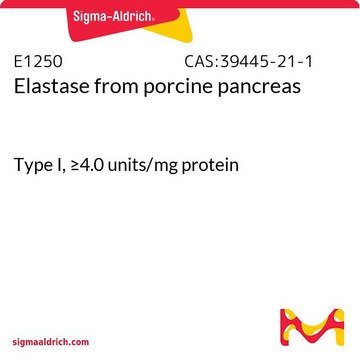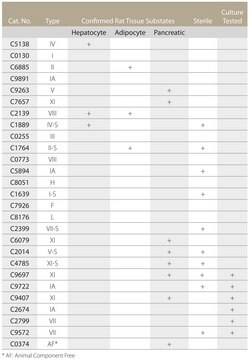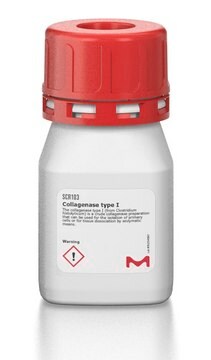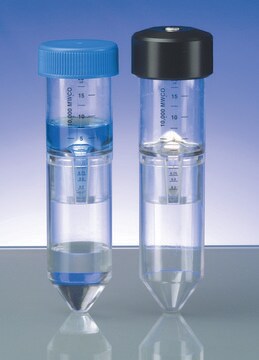V900891
Collagenase from Clostridium histolyticum
Type I, for general use, Vetec™, reagent grade, powder, ≥125 CDU/mg solid
Synonym(s):
Clostridiopeptidase A
Sign Into View Organizational & Contract Pricing
All Photos(2)
About This Item
Recommended Products
grade
reagent grade
product line
Vetec™
form
powder
specific activity
≥125 CDU/mg solid
storage temp.
−20°C
Looking for similar products? Visit Product Comparison Guide
Application
Collagenase from Clostridium histolyticum may be used for the isolation of cells from many types of animal tissue. VETEC Collagenase Type I has the original balance of collagenase, caseinase, clostripain, and tryptic activities, and is suggested for epithelial, liver, lung and adrenal primary cell isolations.
Biochem/physiol Actions
Collagenase is activated by four gram atom calcium per mole enzyme. It is inhibited by ethylene glycol-bis(beta-aminoethyl ether) - N, N, N′,N′-tetraacetic acid, beta-mercaptoethanol, glutathione, thioglycolic acid and 8-hydroxyquinoline.
Quality
Also contains clostripain, nonspecific neutral protease, and tryptic activities.
Unit Definition
One collagen digestion unit (CDU) liberates peptides from collagen from bovine achilles tendon equivalent in ninhydrin color to 1.0 μmole of leucine in 5 hours at pH 7.4 at 37 °C in the presence of calcium ions. One FALGPA hydrolysis unit hydrolyzes 1.0 μmole of furylacryloyl-Leu-Gly-Pro-Ala per min at 25°C. One Neutral Protease unit hydrolyzes casein to produce color equivalent to 1.0 μmole of tyrosine per 5 hr at pH 7.5 at 37°C. One Clostripain Unit hydrolyzes 1.0 μmole of BAEE per min at pH 7.6 at 25°C in the presence of DTT.
Legal Information
Vetec is a trademark of Merck KGaA, Darmstadt, Germany
Signal Word
Danger
Hazard Statements
Precautionary Statements
Hazard Classifications
Eye Irrit. 2 - Resp. Sens. 1 - Skin Irrit. 2 - STOT SE 3
Target Organs
Respiratory system
Storage Class Code
11 - Combustible Solids
WGK
WGK 1
Flash Point(F)
Not applicable
Flash Point(C)
Not applicable
Choose from one of the most recent versions:
Already Own This Product?
Find documentation for the products that you have recently purchased in the Document Library.
Customers Also Viewed
Xiaowu Wang et al.
Frontiers in pharmacology, 12, 731609-731609 (2021-11-23)
The incidence of cardiovascular diseases was significantly increased in postmenopausal women. The protection of estrogen in the cardiovascular system has been further reported for decades. Although menopausal hormone therapy has been used in many clinical trials, the debatable results indicate
Mingle Dou et al.
The Journal of biological chemistry, 295(15), 4937-4949 (2020-03-11)
Mammalian skeletal muscles comprise different types of muscle fibers, and this muscle fiber heterogeneity is generally characterized by the expression of myosin heavy chain (MyHC) isoforms. A switch in MyHC expression leads to muscle fiber-type transition under various physiological and
Haijian Cai et al.
Journal of cardiovascular pharmacology, 80(1), 95-109 (2022-05-06)
Dihydroartemisinin (DHA) is an active form of artemisinin extracted from the traditional Chinese medicine Artemisia annua , which is used to treat malaria. Previous studies have shown that DHA has a therapeutic effect on pulmonary hypertension (PH), but its specific
Bing Zhang et al.
Cell death & disease, 10(7), 520-520 (2019-07-10)
C1q-tumor necrosis factor-related protein-3 (CTRP3) is an adipokine, which exerts protective function in ischemic or diabetic heart injury. However, the role of CTRP3 in cardiac hypertrophy remains unclear. The aim of this study was to investigate the pharmacological effects of
Bing Zhang et al.
Oxidative medicine and cellular longevity, 2020, 9187065-9187065 (2021-01-12)
Mitochondrial unfolding protein response (UPRmt) effectively resists the pathological cardiac hypertrophy and improves the mitochondrial function. However, the specific activation mechanism and drugs that can effectively activate UPRmt in the cardiac muscle are yet to be elucidated. The aim of
Our team of scientists has experience in all areas of research including Life Science, Material Science, Chemical Synthesis, Chromatography, Analytical and many others.
Contact Technical Service










